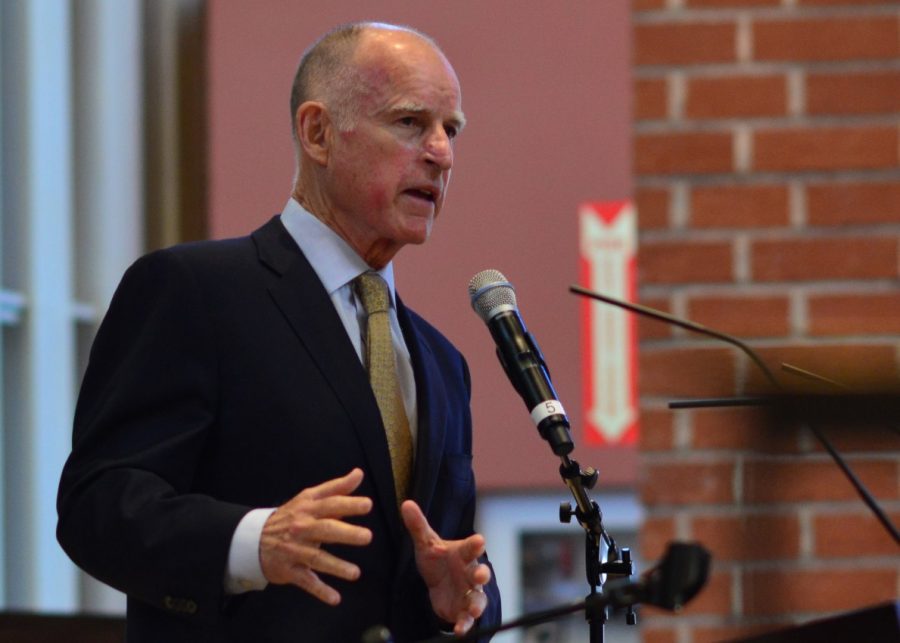Jerry Brown signs and vetoes last bills as California governor
The legislation can, or would have, affect Sac State students
Neon Tommy -CC BY-SA 2.0
Jerry Brown has served as California’s Governor for the past eight years. Earlier this week, Brown signed and vetoed state legislation for the last time as governor.
October 3, 2018
Jerry Brown signed and vetoed pieces of legislation for the last time as California’s governor on Sunday as he finishes eight consecutive and 16 total years in office.
Sunday was the last day for Brown to make the final call on bills passed by the state legislature during the 2018 session, which ended Aug. 31.
In total, 1,217 bills reached the governor’s desk this year, 1,016 of which were signed and 201 were vetoed by Brown.
A number of the bills that Brown ruled on can affect Sacramento State students.
Bills Signed
Straw Ban
AB 1884 was approved by Gov. Brown on Sept. 20. The bill bans full-service restaurants from providing single-use plastic straws to consumers unless requested.
Restaurants that violate the law could face a fine of $25 a day. According to the legislation, “full-service restaurant” is defined as an establishment where food orders are taken after the customer has been seated.
This follows another law signed by Gov. Brown back in 2014, which banned single-use plastic bags in stores.
The new law will go into effect on Jan. 1, 2019.
Expansion of Sexual Harassment Training
With the approval of SB 1343, more employers in California will be required to conduct sexual harassment prevention training to their employees. Previously, the law only required employers with 50 or more employees to hold training to only supervisors.
The new law expands requirements to include all workers under employers with five or more employees.
The training will be available in multiple languages. It will concentrate on sexual harassment prevention and how to recognize it.
The new law will go into effect on Jan. 1, 2020.
Women on Corporate Boards
SB 826 will require publicly held corporations’ board of directors to include female members. Under the bill, all boards of directors will be required to have at least one female member by the end of 2019.
By the end of July, 2021 five-member boards will be required to have a minimum of two female members, and boards with six or more members will require a minimum of three female members.
Companies that fail to comply with the law will face a $100,000 fine for the first violation. A second violation increases that fine to $300,000.
This bill is landmark legislation, as California will become the first state in the nation with such a requirement.
Age to Buy Guns Raised
SB 1100 increases the age to buy a gun in California from 18 to 21. Previously, 18-year-olds could own a firearm that was not a handgun. Now, any firearm owner must be a minimum of 21-years-old.
There are exemptions from the new law, which includes those under 21 who, already have a hunting license from the state, serve as peace officers or are members of the United States Armed Forces.
After the deadly shooting at Stoneman Douglas High School in Florida earlier this year, Florida Gov. Rick Scott signed a similar bill to raise the minimum age to buy a gun to 21.
The California law goes into effect January 1, 2019.
Bills Vetoed
Mental Health Counselors on College Campuses
SB 968 was rejected by Gov. Brown despite passing through the Senate and Assembly without any ‘nay’ votes. The legislation would have required CSU and UC schools to provide at least one full-time mental health counselor for every 1,500 students on campus.
According to the bill’s text, schools in the CSU system are understaffed with mental health counselors to address the needs of their campuses.
Gov. Brown released a message about his decision to kill the bill, saying the schools themselves should be in charge of maintaining a specific ratio of counselors to students, not the state.
Later Last call for Alcohol
SB 905 was not approved by Gov. Brown. The legislation proposed allowing seven cities — Sacramento, San Francisco, Oakland, West Hollywood, Los Angeles, Long Beach and Palm Springs — to extend the cutoff to serve alcohol to 4 a.m. Currently, restaurants and bars cannot sell alcohol past 2 a.m.
In Gov. Brown’s veto message, he said, “I believe we have enough mischief from midnight to 2 without adding two more hours of mayhem.”
This is the second time the author, Sen. Scott Wiener, has attempted to get the bill passed.
Abortion Medication on Campus
SB 320 was killed by Gov. Brown during the last day of signing. The bill would have required all UC and CSU schools to offer medical abortions.
Grants would be given to the universities to help fund the training and supplies needed. In his veto statement, Gov. Brown said, “because the services required by this bill are widely available off-campus, this bill is not necessary.”
At a campaign stop in San Francisco on Tuesday, Oct. 2, Lt. Governor Gavin Newson, the Democratic candidate in the race to succeed Brown, responded to the veto. Newsom told the SF Chronicle he would have signed SB 320 into law.
































































































































